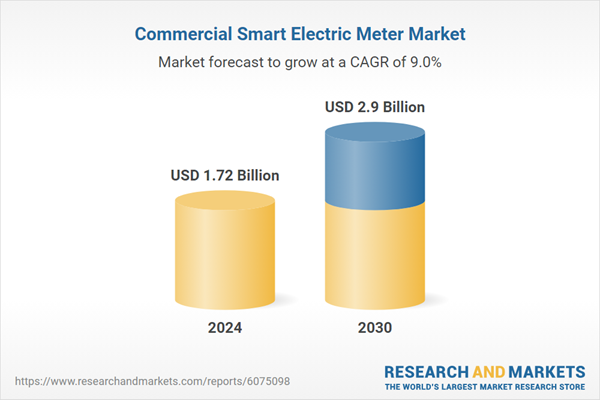Speak directly to the analyst to clarify any post sales queries you may have.
10% Free customizationThis report comes with 10% free customization, enabling you to add data that meets your specific business needs.
Key Market Drivers
Regulatory Mandates and Government Initiatives
Government regulations and initiatives are critical in promoting the adoption of commercial smart electric meters. Worldwide, various governments are enforcing mandates aimed at enhancing energy efficiency, reducing carbon emissions, and modernizing outdated grid infrastructures. For example, India’s Revamped Distribution Sector Scheme (RDSS), initiated in 2022, aims to install 250 million smart meters by 2025. Such programs not only generate strong demand for smart meters but also offer financial incentives like grants and tax benefits to encourage widespread implementation. These measures play a vital role in speeding up smart meter deployments across commercial sectors, helping meet energy conservation targets and supporting the transition toward sustainable energy systems.Key Market Challenges
Data Privacy and Cybersecurity Concerns
Integrating smart electric meters into commercial infrastructures presents notable challenges regarding data privacy and cybersecurity. These meters collect detailed consumption information, which, if not securely managed, could reveal sensitive business operations or customer habits. Cyberattacks targeting smart metering systems can result in data manipulation, operational disruptions, or the compromise of critical infrastructure.These risks can impact not only individual businesses but also the stability of the broader energy grid. Mitigating these threats requires substantial investment in cybersecurity measures, including advanced encryption, secure data storage, and proactive monitoring systems. Regulatory frameworks must also enforce stringent cybersecurity standards to protect consumer data and energy systems. Balancing the benefits of real-time analytics with the need for privacy and grid security remains a significant and evolving challenge.
Key Market Trends
Integration of IoT and Advanced Analytics Enhancing Energy Management
The incorporation of Internet of Things (IoT) technology and advanced analytics is transforming energy management within commercial smart electric meters. IoT-enabled meters allow real-time data collection and two-way communication between utilities and businesses, offering detailed insights into consumption patterns. This facilitates predictive maintenance, energy optimization, and cost reduction. Advanced analytics provide deeper insights, helping businesses detect inefficiencies and apply energy-saving measures. For example, analyzing peak usage times enables companies to adjust operations and avoid higher energy charges. The push toward operational efficiency and sustainability is fueling the adoption of these technologies.Key Market Players
- Landis+Gyr
- Itron Inc.
- Siemens AG
- Schneider Electric SE
- Honeywell International Inc.
- Eaton Corporation
- General Electric Company
- Kamstrup A/S
- Badger Meter, Inc.
- HPL Electric & Power Ltd.
Report Scope:
In this report, the Global Commercial Smart Electric Meter Market has been segmented into the following categories, in addition to the industry trends which have also been detailed below.Commercial Smart Electric Meter Market, By Type:
- Advanced Metering Infrastructure
- Auto Meter Reading
Commercial Smart Electric Meter Market, By Phase:
- Single-phase
- Three-phase
Commercial Smart Electric Meter Market, By Region:
- North America
- United States
- Canada
- Mexico
- Europe
- France
- United Kingdom
- Italy
- Germany
- Spain
- Asia-Pacific
- China
- India
- Japan
- Australia
- South Korea
- South America
- Brazil
- Argentina
- Colombia
- Middle East & Africa
- South Africa
- Saudi Arabia
- UAE
- Kuwait
- Turkey
Competitive Landscape
Company Profiles: Detailed analysis of the major companies present in the Global Commercial Smart Electric Meter Market.Available Customizations:
With the given market data, the publisher offers customizations according to a company's specific needs. The following customization options are available for the report.Company Information
- Detailed analysis and profiling of additional Market players (up to five).
This product will be delivered within 1-3 business days.
Table of Contents
Companies Mentioned
- Landis+Gyr
- Itron Inc.
- Siemens AG
- Schneider Electric SE
- Honeywell International Inc.
- Eaton Corporation
- General Electric Company
- Kamstrup A/S
- Badger Meter, Inc.
- HPL Electric & Power Ltd.
Table Information
| Report Attribute | Details |
|---|---|
| No. of Pages | 188 |
| Published | April 2025 |
| Forecast Period | 2024 - 2030 |
| Estimated Market Value ( USD | $ 1.72 Billion |
| Forecasted Market Value ( USD | $ 2.9 Billion |
| Compound Annual Growth Rate | 8.9% |
| Regions Covered | Global |
| No. of Companies Mentioned | 10 |









